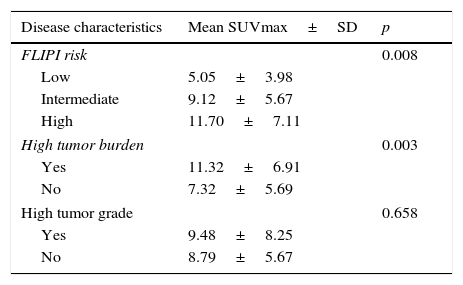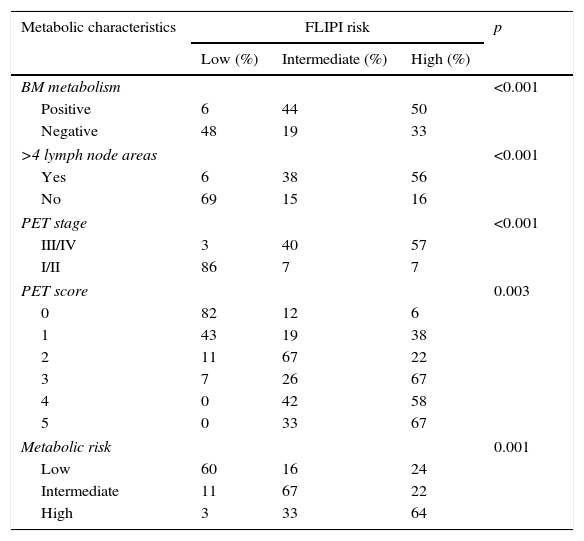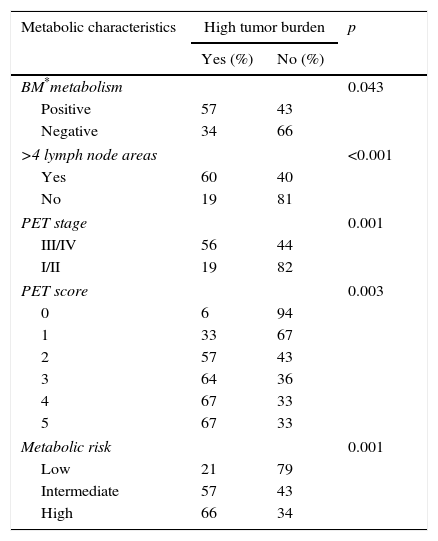To analyze the relationship of clinical variables related to prognosis and tumor burden, with metabolic variables obtained in the staging 18F-FDG PET/CT, and their value in the prognosis in follicular lymphoma (FL).
Methods82 patients with FL, a 18F-FDG PET/CT at diagnosis and a follow-up for a minimum of 12 months, were retrospectively enrolled in the present study. Clinical variables (Tumor grade, Follicular Lymphoma International Prognostic Index (FLIPI) and Tumor burden) were evaluated. Metabolic variables such as SUVmax in the highest hypermetabolic lesion, extralymphatic locations, number of involved lymph node locations, bone marrow (BM) involvement, PET stage and diameter of the biggest hypermetabolic lesion, were analyzed in order to establish a PET score and classify the studies in low, intermediate and high metabolic risk. Clinical and metabolic variables (included metabolic risk) were compared. The relation among all variables and disease-free survival (DFS) was studied.
ResultsThe 28% of patients had a high-grade tumor. The 30.5% had FLIPI risk low, 29.3% intermediate y 40.2% high. The 42.7% presented a high tumor burden.
The PET/CT was positive in 94% of patients. The tumor grade did not show significant relation with metabolic variable. FLIPI risk and tumor burden showed statistical relations with the SUV max and the PET score (p<0.008 and p=0.003 respectively). With respect to DFS, significant differences were detected for the PET stage and FLIPI risk (p=0.015 and p=0.047 respectively). FLIPI risk was the only significant predictor in Cox regression analysis, with a Hazard Ratio of 5.13 between high risk and low risk.
ConclusionThe present research highlights the significant relation between metabolic variables obtained with FDG PET/CT and clinical variables although their goal as an independent factor of prognosis was not demonstrated in the present work.
Analizar la relación entre las variables clínicas relativas al pronóstico y la carga tumoral y las variables obtenidas en la 18F-FDG PET/TC de estadificación, así como su valor pronóstico para el linfoma folicular (LF).
MétodosSe realizó un estudio retrospectivo de 82 pacientes con LF, 18F-FDG PET/TC en el momento del diagnóstico y seguimiento mínimo de 12 meses. Se evaluaron las variables clínicas (grado tumoral, Índice pronóstico internacional para el linfoma folicular (FLIPI) y carga tumoral). Se analizaron las variables metabólicas tales como SUVmax en las lesiones más hipermetabólicas, localizaciones extralinfáticas, número de localizaciones ganglionares afectas, afectación de la médula ósea, estadio PET y diámetro de la lesión hipermetabólica de mayor tamaño, a fin de establecer una puntuación PET y clasificar los estudios en riesgo bajo, medio y elevado. Se compararon las variables clínicas y metabólicas (incluyendo el riesgo metabólico) y se estudió la relación entre todas las variables y la supervivencia libre de enfermedad (SLE).
ResultadosEl 28% de los pacientes tenían un tumor de alto grado. El 30,5% tenía un riesgo bajo de FLIPI, el 29,3% un grado intermedio y el 40,2% un riesgo elevado. El 42,7% presentó una elevada carga tumoral.
La PET/TC fue positiva en el 94% de los pacientes. El grado del tumor no reflejó una relación significativa con la variable metabólica. El riesgo de FLIPI y la carga tumoral guardaron relaciones estadísticas con SUVmax y la puntuación PET (p<0,008 y p=0,003, respectivamente). Con respecto a la SLE, se detectaron diferencias significativas para el estadio PET y el riesgo FLIPI (p=0,015 y p=0,047, respectivamente). El riesgo FLIPI fue el único factor predictivo significativo en el análisis de regresión, con un cociente de riesgo instantáneo (HR) de 5,13 entre alto y bajo riesgo.
ConclusiónLa presente investigación resalta la considerable relación entre las variables metabólicas obtenidas con FDG PET/TC y las variables clínicas, aunque su objetivo como factor independiente de pronóstico no ha sido demostrado en el presente estudio.
Artículo

Revista Española de Medicina Nuclear e Imagen Molecular (English Edition)
Comprando el artículo el PDF del mismo podrá ser descargado
Precio 19,34 €
Comprar ahora












